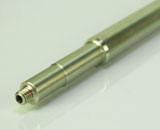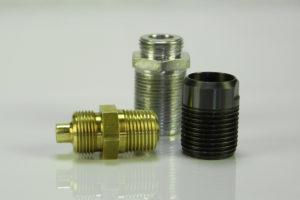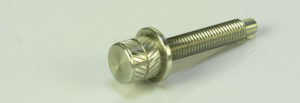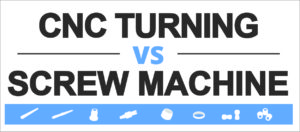
When the screw machine product was created 100 years ago, it’s original purpose was to make screws for a variety of different products. However, while the name has remained the same, the technology behind a screw machine product has evolved throughout the years to meet the needs of modern turned components. CNC (or computer numerical control) turned products is the automation of machine tools that operate via computer-programmed commands, as opposed to mechanically automated machines such as a screw machine. So, what are the benefits of each?
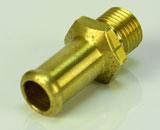 Screw Machine Products
Screw Machine Products
A screw machine product is a class of automatic lathes for small to medium sized parts. The name “screw machine” is considered to be a tad misleading, as these machines don’t only create screws anymore or screw anything into place. Instead, these machines work by spinning metal bar stock on a rotating lathe, which essentially shaves the metal down to a desired size and shape. A screw machine functions with a disc cam, which is a rotating piece used to transform rotary motion into linear motion, or vice versa, using either a single spindle or multiple. Because a screw machine operates with closed spindle collets which hold the cutting tool, deflected debris is reduced to minimal or none at all.
Screw Machine Manufacturing Capabilities
Screw machines are used for bar work in a variety of shapes such as round, hex, or square. The entire bar stock is passed through and turns with the spindle, and is then separated from the part and fed forward, making the screw machine ready for the next part. Screw machines are more time efficient than CNC with their ability to turn 6 to 8 operations simultaneously depending on the number of spindles the machine has. Typically, most automatic screw machines have 6 spindles with some having up to 8 spindles. Screw machines can hold and repeat with tolerances of .0025” of an inch.
CNC Turned Products
The first CNC machines were created in the 1940s and 1950s, modifying existing tools and implementing motors into the design. CNC products essentially function the same way as screw machine products, but instead of being operated by cams, they are mainly controlled by computers. Having transformed a great deal throughout the years, CNC turned products are now equipped to feature more sets of tooling than screw machine products, which allow the machines to perform multiple operations on a part in a shorter amount of time.
CNC Turning Manufacturing Capabilities
CNC turned parts are known for being more precise than its predecessor the automatic screw machine. A CNC machine can rotate parts to speeds up to and exceed 10,000 RPM’s, with accuracies as tight as .0002” of an inch. With accuracies that are able to be achieved and its repeatability it has become the most dependable and efficient way to manufacture precision parts worldwide. Because of the machine’s extreme precision, it is used in a variety of industries such as automotive, aerospace, medical, agricultural, and more.
Do you need a part created but aren’t sure what would be the best process – CNC turning or screw machines? Ask us! We’ll be happy to help you figure it out.

